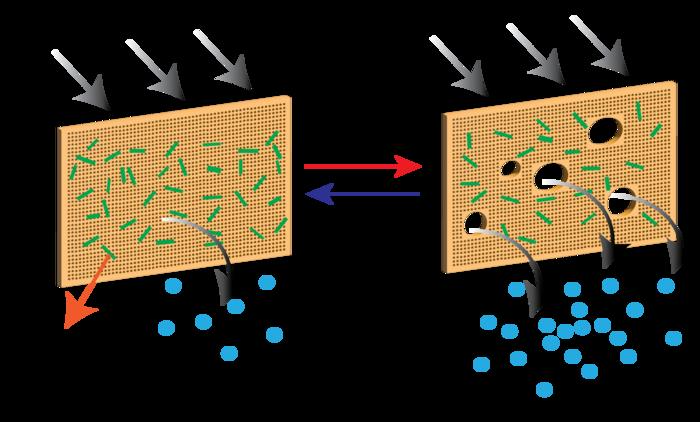A team of researchers from NYU Abu Dhabi (NYUAD) has invented a new type of self-cleaning, hybrid membrane that solves key issues that have hindered desalination methods.
 Smart membrane function. Image Credit: Courtesy of NYU Abu Dhabi
Smart membrane function. Image Credit: Courtesy of NYU Abu Dhabi
Membrane desalination is the most energy-efficient desalination technology. However, desalination membranes are prone to fouling or the formation of scale, resulting in diminished membrane performance, a shorter lifespan, and the need for chemical treatment, which has unknown environmental repercussions.
Researchers from the Institute for Membrane Technology in Italy worked with their collaborators from NYUAD’s Smart Materials Lab and the Center for Smart Engineering Materials to create a special hybrid membrane using stimuli-responsive materials, and thermosalient organic crystals embedded in polymers.
The research was led by Professor Panče Naumov and Research Scientist Ejaz Ahmed. A novel family of dynamic materials called thermosalient crystals is capable of abrupt expansion or motion in response to heating or cooling.
The researchers created a “smart” membrane by fusing these microcrystals with conventional, porous membranes that can self-modulate their pore size and surface characteristics in response to temperature changes. The membrane is activated to efficiently remove the accumulated impurities from its surface because the crystals on its surface react to a brief rise in temperature.
The scientists discovered that this “gating” procedure greatly enhanced the flow of desalinated water during osmotic distillation by more than 43% and improved the membrane’s operational lifetime.
The study, titled Smart Dynamic Hybrid Membranes with Self-Cleaning Capability, was published in Nature Communications.
Hybrid membranes’ capacity to self-clean and reduce fouling could enhance the effectiveness of desalination processes and expand the supply of fresh water. Current water shortages affect more than a third of the world’s population; by 2025, that percentage is anticipated to rise to 50%. Membrane desalination of seawater aids coastal areas in addressing regional deficits in nations with water shortages, such as those in desert regions like the MENA region.
There is an urgent need for energy-efficient membranes capable of water desalination and other separation technologies that eliminate fouling issues without utilizing harsh chemicals as cleaners. The hybrid membrane we have developed demonstrates favorable consistency in performance after several cycles of descaling.
Panče Naumov, Professor, Chemistry, New York University Abu Dhabi
Naumov added, “With more than twenty types of dynamic organic crystals available to use with different membrane compositions, our novel approach represents an important step forward towards the development of a new generation of “smart” membranes that will be capable of self-cleaning in an energy-saving and environmentally benign manner, which will effectively improve the cost-effectiveness of the overall process of potable water production.”
This study is being conducted at the same period as NYUAD is chairing the Universities Climate Network (UCN). The UCN, which is made up of UAE-based universities and higher education institutions, works together to provide discussions, seminars, public events, policy briefs, and student involvement in the run-up to and after COP28.
Journal Reference:
Pantuso, E., et al. (2023) Smart dynamic hybrid membranes with self-cleaning capability. Nature Communications. doi:10.1038/s41467-023-41446-9